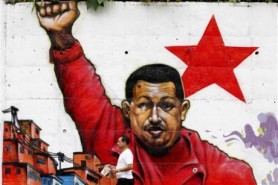CARACAS (Reuters) – Venezuela’s opposition is certain to make gains in parliamentary elections on Sunday but probably not enough to wrest legislative control from President Hugo Chavez in the 12th year of his socialist “revolution.”
By Venezuela’s past volatile standards, campaigning for the 165-seat National Assembly elections has been peaceful, though there are fears of unrest if either side rejects the results.
The energetic Chavez — who has replaced Cuba’s Fidel Castro as Latin America’s biggest annoyance for Washington — has been criss-crossing Venezuela to drum up support for his candidates in a vote that is a precursor to the 2012 presidential race. “The battle goes beyond Sept. 26. Its final objective is 2012, where we will again win the presidency,” Chavez, 56, told supporters during one of his many daily speeches and rallies.

A big victory for Chavez would probably mean a deepening and acceleration of his socialist overhaul of South America’s top oil exporter.
But he could also respond to a weak showing on Sunday by driving quick reforms through the National Assembly before new legislators take office. Bondholders are wary of sudden policy moves after the vote.
Chavez’s popularity is hovering in the 40-50 percent range, according to most polls and analysts. That is well below his highs of previous years, but probably enough to ensure his ruling Socialist Party keeps a majority in parliament.
The Socialists are a couple of percentage points ahead of a newly-united opposition umbrella group, Democratic Unity, polls show. That, combined with changes to voting rules and the electoral map that favour the government, means Chavez’s party enters the vote as favourite.
Opposition parties are, however, guaranteed significant gains because they boycotted the last parliamentary vote in 2005.
Democratic Unity candidates believe voter discontent with Chavez’s authoritarian style, one of the world’s worst murder rates outside a war zone, a second year of recession and untamed inflation give them a real shot at winning a majority.
“The people have fallen out of love with Chavez. We’re coming back!” said Berta Morales, a veteran activist with Democratic Action, one of the parties in the opposition group.
The opposition may run Chavez close on the overall popular vote, giving it a symbolic boost ahead of 2012, although analysts believe his allies will keep control of the legislature.
“Chavez’s party will surely maintain a comfortable majority in the National Assembly given the electoral system is skewed in its favor,” said Eurasia analyst Daniel Kerner.
On the streets, there is more grumbling than in the past from Chavez supporters, but they remain grateful for a plethora of government initiatives in poor areas, ranging from subsidized food outlets to free clinics run by Cuban doctors.
“He has transformed Venezuela in a way nobody ever did in the past,” said Elizabeth Ascaneo, in a lively debate with neighbors in a poor area of Guarenas town outside Caracas.
“I don’t deny he has a lot more work to do. So our task is to get the votes out on Sunday to enable him to carry on working for us,” she added, minutes before the president came by on an open-topped vehicle during a campaign caravan.





